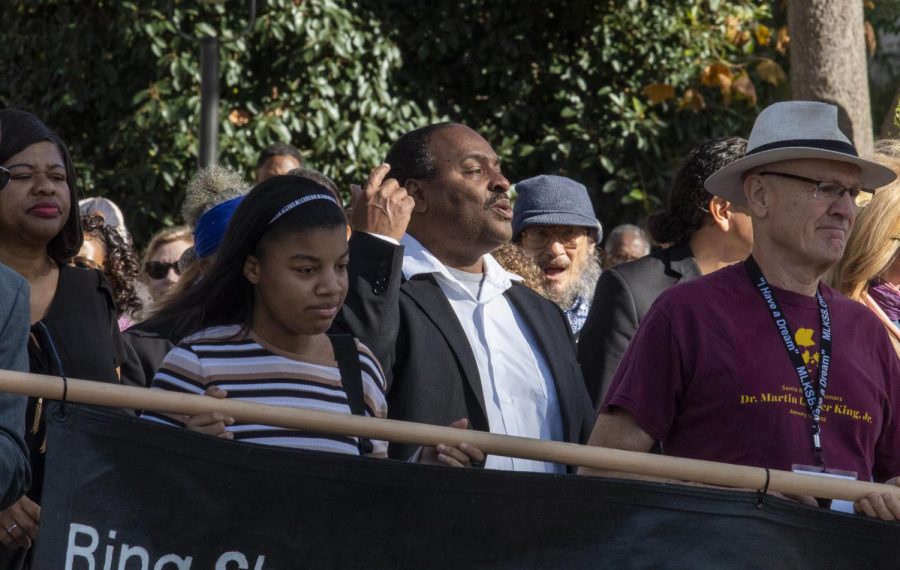A chorus of voices sang out “We Shall Overcome” as a procession marched from East to West Campus Saturday to honor Dr. Martin Luther King Jr.’s famous journey from Selma to Montgomery, Alabama.
The marchers, led in prayer and song by Rev. Roderick Murray, held the event to remember the bravery of protesters who crossed the Edmund Pettus Bridge in 1965 in the face of police violence.
“It ain’t about us, it’s about Jesus today, and it’s about Martin Luther King today,” Murray said as the group began crossing.
Isaac Garrett, a founder of the Martin Luther King, Jr. Committee of Santa Barbara, said the event is important because it reminds people of the impact doing good can have.
“There are few things that you can really have confidence in to do the right thing these days,” he said.
The procession marched from Friendship Plaza in front of the Campus Center across the bridge to the Business-Communication Center, where a series of speakers and performers discussed King’s legacy and the steps that still need to be taken to combat racism today.
Keynote speaker Wendy Sims-Moten, a member of the Santa Barbara Education Foundation board, emphasized the “uncommon courage,” it takes to stand up to racism. She warned against complacency when it comes to issues of race and said all are capable of the courage required to create change.
“These were ordinary folks doing extraordinary things,” Sims-Moten said, referring to the activists that made the abolishment of slavery in the 1860s and the civil rights movement of the 1960s possible.
Speakers Akivah Northern and Regina Moore Davis also discussed modern racism and potential solutions.
“Many people are being discriminated against and don’t even know it,” Moore Davis said.
She explained that if a woman or person of color is being paid less than their counterparts for the same work, they might not even know it.
City College history professor Justina Buller, who attended as a member of Showing Up for Racial Justice, which had a booth set up on Saturday, said events like the procession are important so people do not forget how our country became what it is today.
“Overt racism isn’t as bad as it was, but we are not done,” Buller said. “We can’t forget that racism still exists.”
The portion of the event held inside the center concluded with a performance by Santa Barbara Ring Shout, led by Frances Moore.
Ring shout is a kind of music that was developed by African-American slaves. It has lyrics with religious messages in a call-and-response style, accompanied by dancing and clapping.
Brenda Nelson, one of the performers, said she does it because she feels it is important to preserve her African-American heritage.
“It’s a diverse group of people trying to keep the history of ring shout alive,” she said.
The afternoon concluded with food and beats played by the Sharin Kurstin drum group, whose members are trained in West African drumming.
Joanne Young, a former principal of four schools in the Goleta Unified School District, attended the event with her grandson. She said the march is important because today’s youth don’t have the same connection to King’s accomplishments that previous generations had.
Young added that the recent racial tension at City College increases the importance of connecting to past generations.
“We need to step it up and have our voices heard,” she said.









